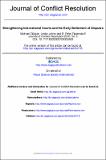| dc.contributor.author |
Michael Gilligan, Leslie Johns and B. Peter Rosendorff |
| dc.coverage.spatial |
United States |
| dc.date.accessioned |
2016-01-07T15:29:09Z |
| dc.date.available |
2016-01-07T15:29:09Z |
| dc.identifier.uri |
http://desa1.cejamericas.org:8080/handle/2015/3465 |
| dc.description.abstract |
How does variation in the strength of a court’s jurisdiction and enforcement affect strategic behavior by states involved in international disputes? The authors construct a formal model and identify three important ways that legal institutions can have a deleterious effect on international cooperation by magnifying the bargaining problems arise from incomplete information about the quality of the legal claims. First, strong courts create less information revelation in pretrial bargaining. Second, strong courts reduce the likelihood of pretrial settlements between states.. Third, strong courts lead to more brinksmanship over high-value assets, which leads to conflict if the court refuses to intervene. The authors argue that a key policy implication of their model is that its attempts to strengthen international courts must be accompanied by increased precision of international law to ameliorate the deleterious effects on strong courts. |
| dc.language.iso |
English |
| dc.title |
Strengthening International Courts and the Early Settlement of Disputes |
| dc.ceja.source |
Fuente: Journal of Peace and Conflict Resolution |

